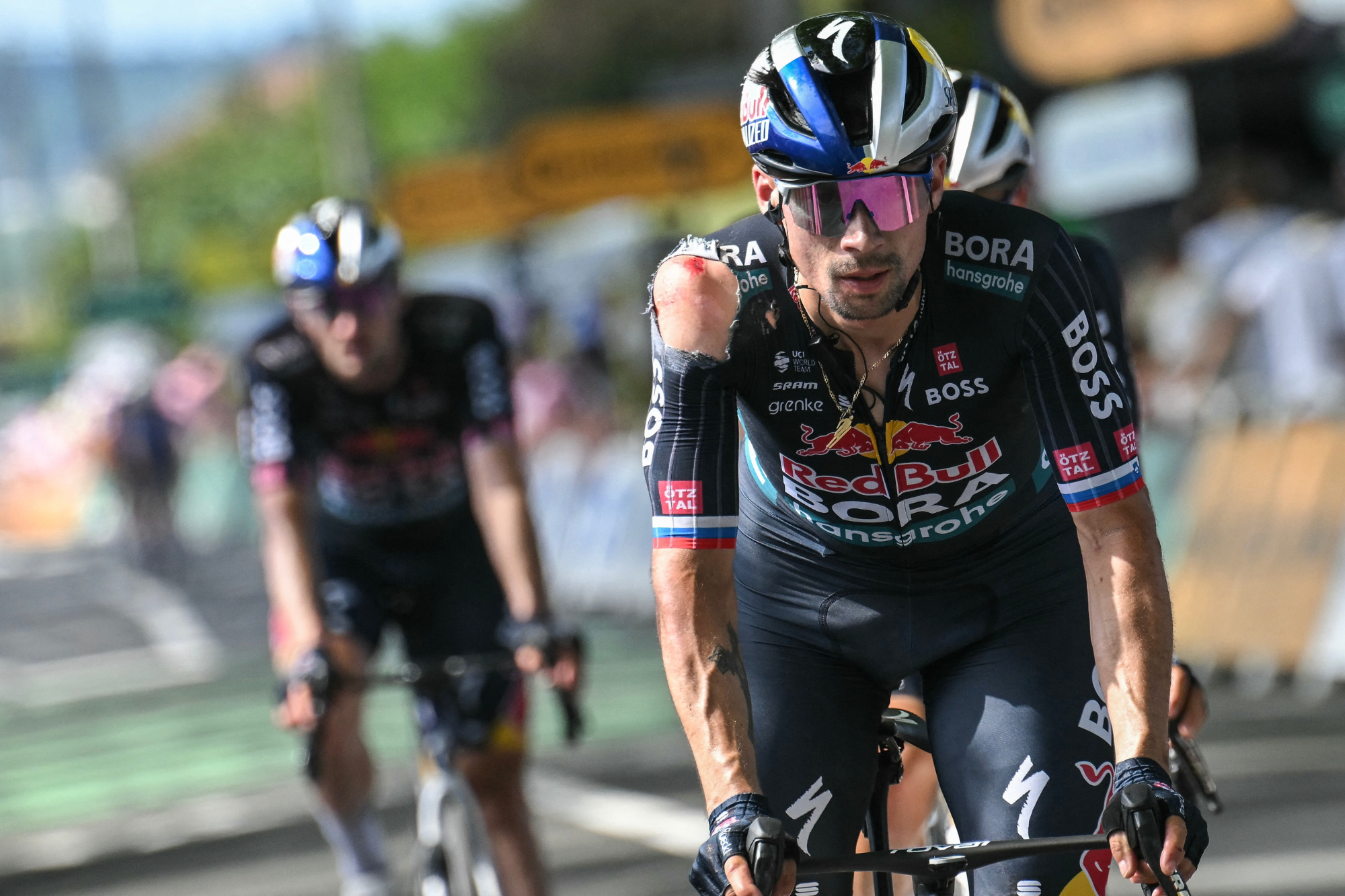
Boom, splat, whatever onomatopoeic sound takes your fancy, it’s happened again. Primož Roglič’s Tour de France hopes appear to have ended how he least wanted, but how it always seems to: with a crash.
Stage 12 of the 2024 Tour was another snooze-fest, despite the lumpy parcours, following the trend of this edition of good days being really good and bad days being really bad. With the breakaway of four caught – at least there was a break today – a small traffic island 10km from the finish in Villenueve-sur-Lot saw the peloton split in two, half going left, half going right. It was unremarkable in how common an exercise this was for professional bike riders.
But this time, disaster was to strike. An Astana-Qazaqstan rider collided with the raised pavement in the centre of the road, most riders avoiding an innocuous crash – race leader Tadej Pogačar almost seems immune from such incidents – but not Roglič. Of course not Roglič.
In 2021, a year on from having yellow ripped from his shoulders by his compatriot Pogačar on the penultimate day time trial – an event that he is best known for despite his other four Grand Tour wins – he crashed with 10km to go in an opening week stage was shortly out the race; in 2022, ditto, and registering a DNF by stage 15; 2023 he was left at home; and now this, 2024, with a new team, Red Bull-Bora-Hansgrohe, fully dedicated to him, and two crashes in two days.
On stage 11 – yes, yesterday – he fell in the final two kilometres but remounted, and 24 hours on he was tumbling to the ground once more. He finished 2:27 behind stage winner Biniam Girmay of Intermarché-Wanty and, more crucially, his GC rivals, and slipped from fourth to sixth on GC. He’s now 4:42 off Pogačar, his hopes as good as extinguished. Yellow, so coveted and desired, is stubbornly elusive, perhaps forever.
“Well, it’s terrible obviously, a leader crashing and after yesterday also,” his team DS Rolf Aldag said, the veteran sports director controlling spokesperson duties while Roglič was attended to by his medical team. “He came to the finish line but he lost some time. That was not good, certainly we wanted to avoid that. It’s never good, it’s never nice and it certainly wasn’t the plan.”
The Curse of Roglič is something his new employers are becoming well acquainted to, only seven months into their relationship. He was concerningly off the pace at March’s Paris-Nice, crashed in that crash at April’s Itzulia Basque Country, and has lagged in the Tour’s first half, despite winning June’s Critérium du Dauphiné.
The latest race content, interviews, features, reviews and expert buying guides, direct to your inbox!
At Visma-Lease a Bike, the team who refer to him as ‘The King’ after he delivered 74 wins over eight seasons, they were emphatetic for their former teammate, even if his fall gives Jonas Vingegaard a more comfortable cushion in the fight for a Tour podium, and also reduces the battle for yellow to three. “I feel really sorry for him – he’s had so much bad luck like this already before,” Wout van Aert said. “A GC shouldn’t be decided on a stage like this.” Frans Maassen, so often the DS in the car accompanying Roglič, sighed: “It’s really shit for Primož. We want him to have some good luck.”
Pogačar, nine years his countryman’s junior, was just as sympathetic. “It was a big shock. Shit news, bad news, and I’m really disappointed and sad for him. He was looking better every day in this Tour, and was coming strongly into this second week. I wish him the best, I hope he didn’t injure himself. Everyone knows he’s a big fighter.”
The apparent voodoo afflicting Roglič needs to be put into context: he’s won the Vuelta a España three times, been victorious in the Giro d’Italia, and has won a combined 19 stages in the three Grand Tours – almost an entire three-week race. But the Tour continues to resist him, obdurately pushing back against his advances, slamming its figurative doors in his face each and every time he seeks out its top step. It’s not even a love-hate relationship anymore, but an association where there’s one only willing party – and that party is approaching 35 years of age; only one rider, Firmin Lambot in 1922, has won the race within five years of his 40th birthday. And he wasn’t competing against generational talents like Roglič is.
It’s not known how serious Roglič’s latest injuries are – Aldag, ever the compassionate one, stressed that the importance was Roglič’s health and not whether or not he will continue in the race – but he does not need an x-ray scan to diagnose the prognostic of his maillot jaune chances: they’re over, barring a Roglič redemption and a Pogačar collapse that would eclipse Planche des Belles Filles of 2020. “We will have different thoughts on fighting for the podium depending on how he is and if he can continue or not,” Aldag said. “We will have to listen to our medical team and what they think and can do. We will see what tomorrow brings.”

